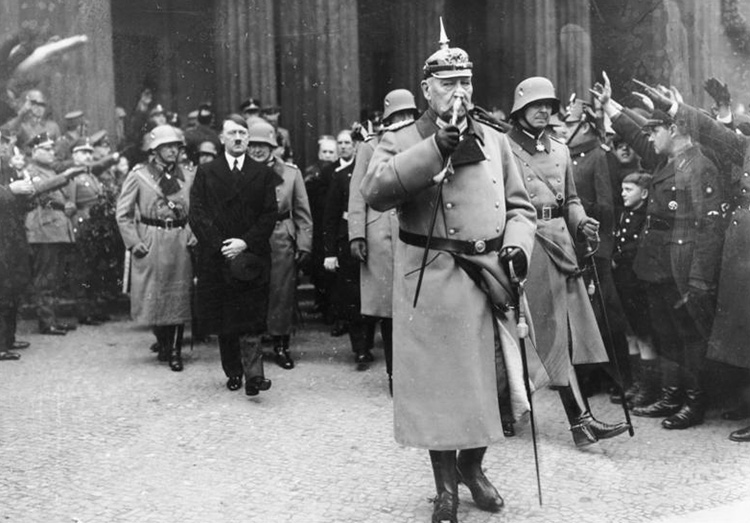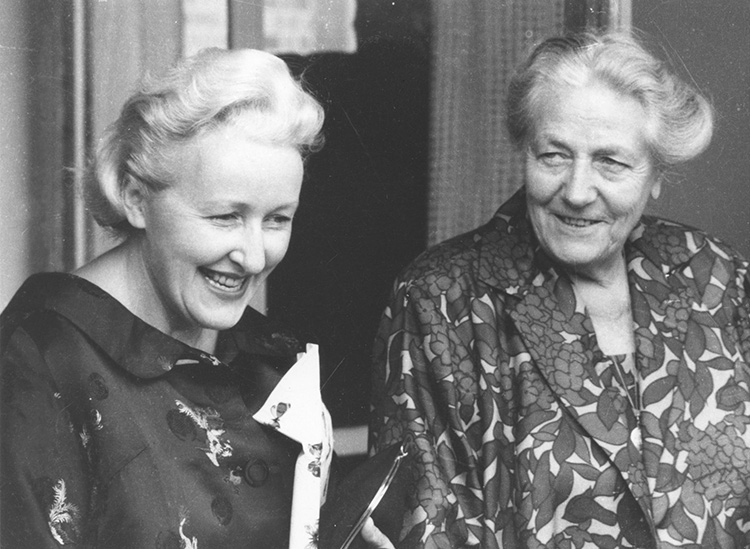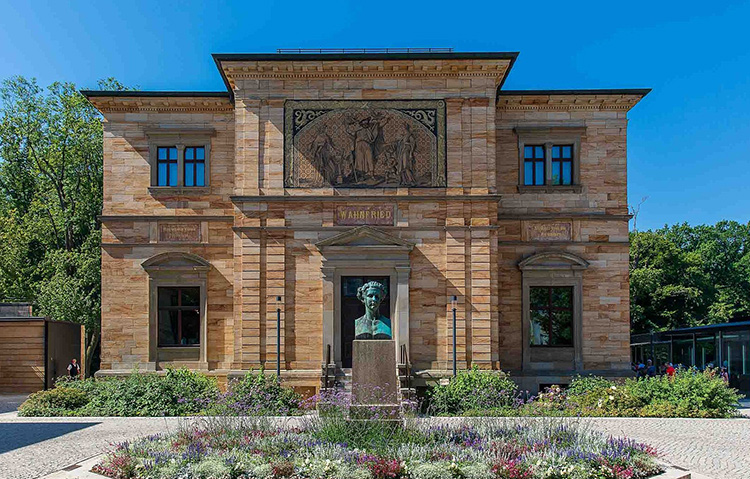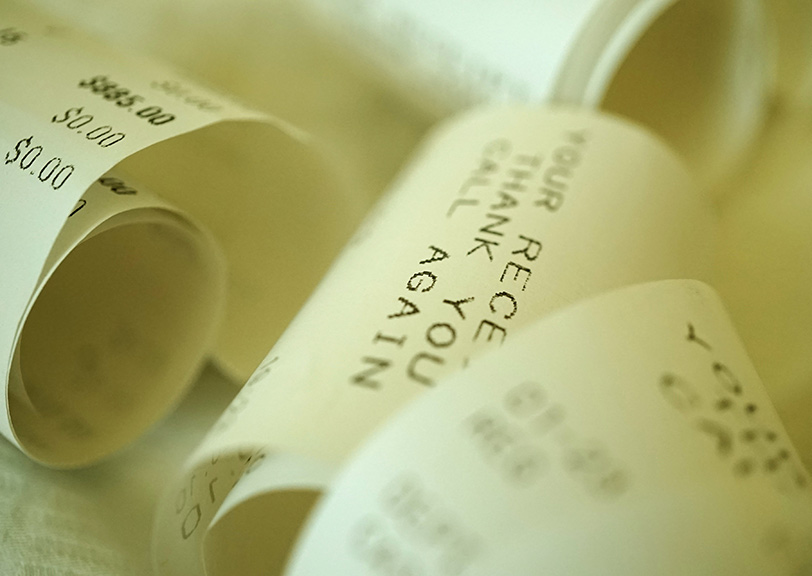ENTER YOUR EMAIL TO RECEIVE OUR WEEKLY NEWSLETTER
A New Yorker Abroad—in ’60s Germany
A visit to Richard Wagner territory in Bayreuth brings a young New York Jew face to face with the land of the Kaiser—and postwar lies and effrontery
By Ian Strasfogel

War is on the agenda. Hitler, accompanied by the members of the Wehrmacht—armed forces of the Third Reich—on Remembrance Day, 1934 in Berlin, honoring soldiers who died in armed combat. Photo: Creative Commons.
. . . . . . . . . . . . .
Dec. 31, 2022
I arranged to meet Mausi at the stage door shortly before Parsifal began, so she could slip me into the auditorium. First, however, I needed some lunch. I rushed into a Wursthaus and in fragmentary German asked for what I thought would be a filling plate of goulash, only to discover it was goulash soup, with hardly any meat or vegetables. A small beer ordered to go with it turned out to be a gigantic tankard. Slurping down soup and beer, I swiftly settled the bill.
The sun slammed down as I raced to the Festspielhaus. feeling oceans of beer and soup sloshing around inside me. The drink had gone to my head. No time to worry about that—it was nearly three. Mausi would be annoyed.
She was the “good” Wagner grandchild—the only member of her large immediate family who didn’t cozy up to Adolf Hitler and revel in his patronage. In fact, she was so revolted by her family’s racist friend that she fled Germany in 1939 and became an American citizen.
After the war, Mausi’s New York friends assumed that the American Army, which occupied Bayreuth, would take the festival away from her Hitler-loving relatives and present it to her. They removed Mausi’s mother from the directorship, turning it over to her two brothers, Wieland and Wolfgang, even though they were part of the Nazi elite. Mausi contented herself with running the Bayreuth Master Classes—a freewheeling program for operatic hopefuls.
I burst into the backstage reception room, panting hard and swimming in sweat. Mausi was standing by the door, a square battleship of a women none too pleased at my lateness. Even from a distance, her resemblance to her grandfather was startling, if not downright eerie—the clear, penetrating blue eyes, the prominent hawklike nose, the broad, noble forehead, the abundant shoulder-length hair. It was hard not to think of her as Richard Wagner in drag.
“You nearly missed the curtain,” she said curtly. I felt suitably chastised as we rushed through the empty lobby and up a few flights of stairs at the front of the theater.
Mausi shouted at an usher just about to lock a broad unmarked door. “Hallo, Leonie, not so fast!” The young woman hastily stood back as Mausi shoved me into a broad box at the exact center of the auditorium. Some of its elderly occupants swiveled around and glared, as if our lateness were a personal affront. An older gentleman in a gray double-breasted suit recognized my companion and rose stiffly to his feet. He took Mausi’s hand in both of his and bowed his head till his lips hovered just above it. “Ach, Frau Wagner, I’m greatly honored.” Mausi nodded and extracted her hand. Obviously, it took more than old-world charm to impress Bayreuth royalty.
“Just so you know, Herr Metzger, this gentleman is my guest. He’ll be standing at the back of our box.” The old man nodded and, to my amazement, clicked his heels. I was suddenly face to face with the old Germany, the Germany of the Kaiser and steel-tipped helmets. I thought that sort of thing had long since vanished. But obviously not in Bayreuth.
With Mausi gone, I finally had a chance to study firsthand the shrine that Richard Wagner had built for himself. The world-famed Festspielhaus was disconcertingly plain, lacking any of the charm, color, or luxury one expects from an opera house. One searched in vain for bourgeois amenities—the gilt or red plush, the flocks of cherubim prancing across the proscenium.
The audience was comparably drab. In 1962, the war still a vivid memory, the resurgence of the German economy had not yet obliterated its horrors. The attendees were unusually elderly, dressed in somber outfits recently retrieved from the attic or storage vault. It seemed like a convening of ghosts from decades earlier. I missed the high fashion regularly encountered at the Met in New York.
Strikingly evident, and greatly appreciated, was the public’s respect for the occasion. Old and drab though attendees were, they wanted, needed to be there; they were worshippers at the shrine. I heard no jittery laughs, no mindless chitchat, only a quiet, steady hum of dedicated engagement. Opera as experience, not entertainment.
On this occasion, the prelude to Parsifal crept up on us so softly, so tenderly, we hardly were aware that it had started. The anguished opening bars emanated from the void, the all-enveloping darkness of the hall. We sensed it before we actually experienced it as actual notes. There seemed to be no one specific point from which the music flowed. It was everywhere and nowhere. The hall had become a giant wooden megaphone. The walls, the chairs, the floor, everything resounded with Wagner. As the sound surged and subsided, the darkened room itself seemed to expand and contract along with it. The space was subsumed in music, the music in space. It was thrilling.
When the curtains opened on the second scene, Wieland’s brilliance announced itself. There was no scenery as such; only vast, brooding space. The effect was magnified by the famous Bayreuth bells, installed on the sides of the stage to Wagner’s specifications expressly for use in this scene. What an effect they made—like the quaking of the earth itself. Their dark resonance set the floor and walls buzzing. Their impact, combined with Wieland’s astonishing conception of theatrical space, overwhelmed me. I had encountered the operatic sublime.
I also encountered the full effects of that giant tankard of beer, lurching violently to the right, hitting my elbow on the side of the box. It made a tiny sound, barely audible, but the dignitary in the front row heard it—the man who had so gallantly kissed Mausi’s hand. He spun around and glared, his face twisted in outrage. He jabbed his finger to his lips and let out a savage “zittt!”
His harshness shouldn’t have surprised me. I was standing in the central box at the Bayreuth Festival, where Adolf Hitler had often sat as guest of honor, flanked by his hostess, Winifred, the composer’s daughter-in-law (who was British-born—talk about craziness), and her four children. Hitler was an ardent Wagnerian, after all. For him, the Bayreuth Festival was Germany’s purest, proudest cultural artifact. It brought to life Wagner’s dreams, and his, of Teutonic supremacy.
I, a New York Jew whose father had escaped Hitler’s Germany by the skin of his teeth, was repulsed by the thought that the demon of our century had been honored and glorified not far from where I was currently standing. No doubt many of my fellow audience members had leapt to their feet and gleefully raised their right arms when they discovered the great man sitting in their midst. And that officious guy who barked at me, that self-appointed custodian of social propriety, what crimes did he commit under the cover of the Nazi plague?
Then Wagner’s music rose up and swept away the nightmarish past.

Friedelind Wagner, left, granddaughter of Richard Wagner (and great granddaughter of Franz Lizst), with her British-born mother, Winifred Wagner, in the 1960s. Photo: Richard Lammel, Wolfgang Lammel Archive.
. . . . . . . . . . . . .
The next day, Mausi picked me up in her Citroen sedan, partly because it drove the villagers crazy. They were outraged that a granddaughter of the great Richard Wagner had the effrontery to drive a French automobile. The car’s raucous horn, which resembled the lowing of a demented cow, delighted her enormously.
“I always use it when I pass the older villagers …. They long for the good old days, when Hitler was in charge and everything was nice and orderly.”
“It wasn’t so nice for my dad or millions of others.”
“Of course, but we’re talking about Bayreuth, a little farming village. The people here were very pleased with U.S.A.”
“What does America have to do with it?”
“It’s my mother’s expression—U.S.A., unser seliger Adolf, our blessed Adolf.”
“She actually says that?”
“Not to the press, of course, but to her friends. And to the cleaning staff. My mother’s never going to change. She’s still angry with the Americans for using the festival theater as a canteen for the troops after the war. She found it a desecration. How dare American soldiers sing and dance on the stage that Richard Wagner built.”
“She must really have hated the pop music.”
“She hated the Black soldiers even more.” Mausi could tell I was deeply shocked. “Oh, yes, my Mama’s quite the racist. She went apoplectic when my brothers cast Grace Bumbry last year. A Black woman singing in the Bayreuth Festival!”
“She sounds pretty disgusting.”
“Yes, but she also can be quite charming.”
“Really?”
“You’ll see for yourself this Friday. She’s invited the entire master class to a violin-piano recital at Haus Wahnfried. It’s a lovely program—Beethoven and Brahms.”

Haus Wahnfried, Wagner’s villa in Bayreuth, later frequented by one of his admirers, Adolf Hitler. Up front is a bust of King Ludwig II of Bavaria, who financed the building’s construction in the 1870s. Photo: Richard Wagner Museum, Bayreuth.
. . . . . . . . . . . . .
Haus Wahnfried, Richard Wagner’s luxurious villa, lies at the base of the hill on which the Festspielhaus is built. I was greeted on the front steps by Frau Winifred herself, all two hundred pounds of her. After Mausi’s extensive complaints about her mother, I was startled by how friendly and welcoming the old lady was—and by her pitch-perfect English accent. It was as if there had never been a Hitler or a Holocaust or a devastating world war.
Broad-beamed and strikingly hearty, Winifred Wagner energetically pumped my hand. “Welcome to Haus Wahnfried, junger Mann,” she said.
She said this without a trace of irony or condescension. I suddenly had the feeling that mother and daughter got on far better than I had supposed.
I was struck by her crisp and jaunty English. To me, it sounded like the fancy talk of Great Britain’s ruling classes, the horsey set that owns sprawling rural estates and London townhouses. Indeed, Frau Wagner was born Winifred Williams in Hastings, England. Her impoverished parents having died not long after her arrival, she was adopted at age ten by the elderly Karl Klindworth, a distant German relative, and his wife. Klindworth had created all the piano reductions of Wagner’s operas and long been an intimate of the great composer. Winifred’s repeated visits to Bayreuth in the company of her adoptive parents led to her unlikely marriage to Siegfried Wagner, the composer’s only son, in 1915, when she was eighteen and he forty-six. They had four children in rapid succession—another unlikely occurrence, since Siegfried was predominantly homosexual.
Blissfully unconcerned by the strangeness of a former British subject becoming the guardian of the shrine of Richard Wagner, Winifred Wagner radiated an eerily commanding self-assurance. There could be no doubt that she, and only she, was the chatelaine of the home of Richard Wagner. She pointed me in the direction of the music room, where the concert would be held. “You’ll find my daughter waiting for you there.”
Mausi stood in the middle of the large music room surrounded by a milling crowd of guests.
“That’s Mama’s contingent,” she said. “Many of them have been coming here since the 1920s, when she was introducing her protégé to anyone who might be of assistance. Hitler was always dropping by to raise funds and spread the poison. When the meetings were over, he’d come into the nursery and play with us. Very sweetly, I must say.” Her attention suddenly shifted.
I swiftly made my way to the last row. The master classes consisted of a motley bunch of ambitious young singers, conductors, and directors. Our bright, informal clothing and lively chatter starkly contrasted with the somber attire and reverential behavior of Winifred’s fan club.
The concert was being held in the study, an impressive space with three walls of built-in bookcases which indisputably remained the room where Richard Wagner had finished Parsifal, where he and his father-in-law, the great composer and virtuoso Franz Liszt, had regularly conversed and performed, where decisions of the utmost artistic importance to the fate of his works had been made by Wagner himself in consultation with his trusted deputies, among them, the distinguished conductors Hermann Levi and Hans Richter. In other words, this place was hallowed ground.
Today, what I most recall about the concert, beyond the fluency and engagement of the performance, is the audience’s intentness. No shifting in seats, no wandering glances, no whispered commentary.
The concert over, I couldn’t resist taking a look at the impressive book collection. It covered three walls, floor to ceiling and featured elegant volumes on history, philosophy, poetry, the sciences and the arts. Clearly, the residents of Haus Wahnfried were exceptionally cultivated.
And then I saw it in the place of honor—the exact center of the middle shelf, where no one could possibly miss it.
Mein Kampf.
I took the book down and opened it. Sure enough, it was an inscribed copy: “Fuer Wini, Wolf” Wolf had been Hitler’s code name during his years in the political wilderness.
I still clearly remember my physical revulsion. I was literally shaking with suppressed fury. How dare she own such a thing and display it so prominently? Had she no shame? Had she no sense? How could any civilized person give pride of place to a work of such unrelieved hatred? The book at that time could still not be published in Germany for what I and most everyone else thought were perfectly obvious reasons. Winifred clearly felt otherwise. What Hitler did, what people said he did, was unimportant to her. He was her friend. Case closed.
Suddenly, the elegant surroundings, the charming welcome, the beautiful music, the witty, knowing repartee, nauseated me. It was all a lie, an insult, an affront. Even Mausi’s spirited sniping at her bigoted old mother seemed ridiculous and beside the point. The whole family was sick, the whole festival, the whole world.
At that exact moment, Frau Winifred, the household’s matriarch, rose up in all her haute British bourgeois splendor and told her guests that they could greet the artists in the first-floor dining room, where tea and cakes were being served.
I mumbled my apologies, and rushed back to the safety and sanity of my little hotel room.
Ian Strasfogel is an author, opera director, and impresario who has staged over a hundred productions of opera and music theater in European and American opera houses and music festivals. His comic novel, Operaland, and his biography of his father, Ignace Strasfogel: The Rediscovery of a Musical Wunderkind, were both published in 2021.











